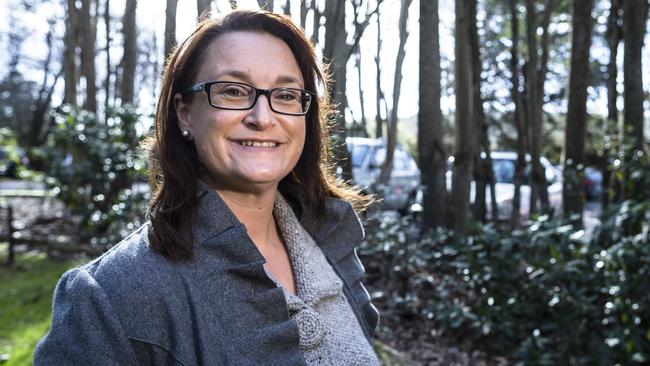Greens MP Nick McKim clarifies citizenship
Senator Nick McKim has waited more than two weeks for paperwork from the UK, after the resignation of two colleagues.

Tasmanian Greens senator Nick McKim has finally posted a letter from the UK Home Office confirming it received a form to renounce his British citizenship before he was chosen to sit in parliament.
Senator McKim has been waiting more than two weeks for the paperwork after the party’s former co-deputy leaders Scott Ludlam and Larissa Waters discovered they were citizens of New Zealand and Canada respectively and were forced to resign.
“(The letter) makes it very clear I filled in the appropriate form to renounce my British citizenship before I was ever put up into the Senate,” Senator McKim told Sky News, adding his support for an independent audit of all MPs.
“I was never really nervous about that (his citizenship status) or in any doubt but I understand given the public interest and the media interest that people wanted to see the bit of paper.
“We’d like to see this put to bed, in doing that we need to make sure that the Australian people have got confidence that everyone is sitting lawfully in the Senate and in the House of Representatives.”
Here you go peeps. Hope to see Malcom Roberts' empirical evidence soon pic.twitter.com/WSOU7nwmLb
— Nick McKim (@NickMcKim) August 1, 2017
Labor MP Justine Keay has conceded she did not receive confirmation her British citizenship had been renounced and registered until after the July election, as she becomes the latest MP to clarify her citizenship status following several bungles.
Questions had been raised over Ms Keay, a Tasmanian who gained British citizenship through her father, after she declined to provide the relevant paperwork proving she had renounced her dual citizenship.
The first-term MP had also refused to say what confirmation if any she received from the British government.
A person who is a dual national at time of nominating or on the day they are elected is deemed ineligible to sit in parliament under section 44 of the Constitution.
Under increasing scrutiny, Ms Keay today outlined the “reasonable steps” she took to renounce her citizenship before nominations closed to run for parliament on June 9 last year. However she has not released documents backing up her version of events.
While defending the processes she went through, Ms Keay acknowledged on 89.3 LAFM radio she did not receive confirmation of her non-citizenship by the UK government until July 8, a month after nominations closed and a week after the July 2 election.
She said her renunciation was registered on July 11.
The revelation has sparked fresh speculation within government ranks she may be ineligible to be in parliament but University of New South Wales constitutional law expert George Williams said it appeared Ms Keay had done “everything she could have possibly done” to renounce her dual nationality before the election.
“It sounds quite meticulous. It wasn’t left to the last minute and of course people can’t do things before preselection or they know they’re running for office,” he said.
“It does sound like an example where a person was a dual citizen at the wrong time but has done would was expected of them to revoke that status. It sounds reasonable to me.”
Ms Keay’s case is similar to that of One Nation senator Malcolm Roberts. There is greater uncertainty surrounding the Queenslander after he revealed last week he did not receive his formal British citizenship renunciation document until December 5 — five months after the election.
Senator Roberts said he had taken “reasonable steps” before nominations closed to revoke his dual citizenship — by repeatedly emailing the British consulate — but did not specify whether he had filled out the proper paperwork.
It is also unclear why he did not receive his renunciation document sooner. Senator Roberts said he started going through the process in early May, like Ms Keay.
Professor Williams said if Senator Roberts had outlined more concrete steps like that used by Ms Keay there would be less of a cloud hanging over him.
The Greens are considering referring Senator Roberts’ election to the High Court next week, in a move backed by crossbench senator Derryn Hinch.
They will need the support of either Labor or the government, and potentially several more crossbenchers, for that referral to be carried.
The Senate will also refer the elections of Mr Ludlam and Ms Waters, as well as former Nationals cabinet minister Matt Canavan, who says he did not know his Australian-born mother had applied for him to be an Italian citizen by descent of his grandparents.
Ms Keay said British citizenship had been “difficult to give up” as it was her “last tangible connection” to her father, who died when she was ten years old.
“But I understood the enormous privilege of representing my community in the federal parliament, and took the requirements very seriously,” she said.
“For those questioning how ‘Australian’ I am, I was born in Tasmania and am a direct descendant of William Geeves, who settled in the Huon Valley of Tasmania in 1842.”
STEPS TAKEN BY JUSTINE KEAY TO RENOUNCE BRITISH CITIZENSHIP
“On 9 May 2016 I renounced British citizenship by completing UK Home Office Form RN, ‘Declaration of Renunciation of British Citizenship’,” she said.
“On 13 May 2016 I sent the ‘Declaration of Renunciation of British Citizenship’ to the Home Office via International Express Post, together with payment of the processing fee, my Australian passport and my British passport, which I formally surrendered.
“Australia Post confirmed my renunciation was delivered to the Home Office in the UK on 23 May 2016. My renunciation was officially receipted by the Home Office on 31 May 2016. I had therefore taken all reasonable steps to renounce British citizenship before nominations for the 2016 federal election officially closed at 12 midday on 9 June 2016.”



